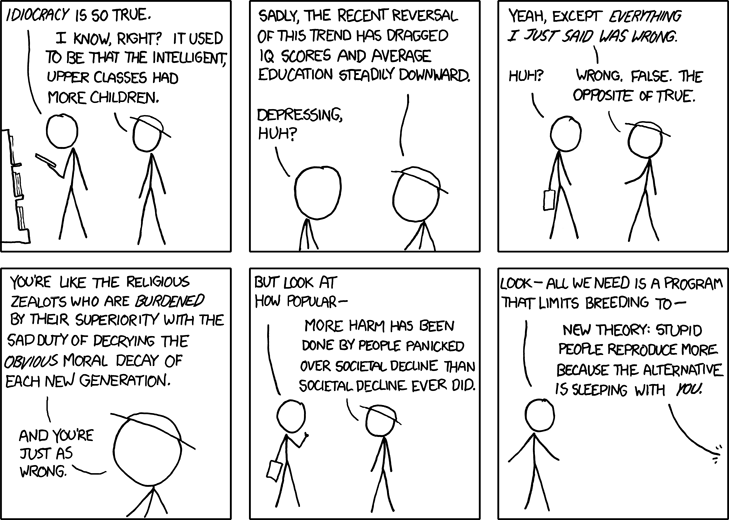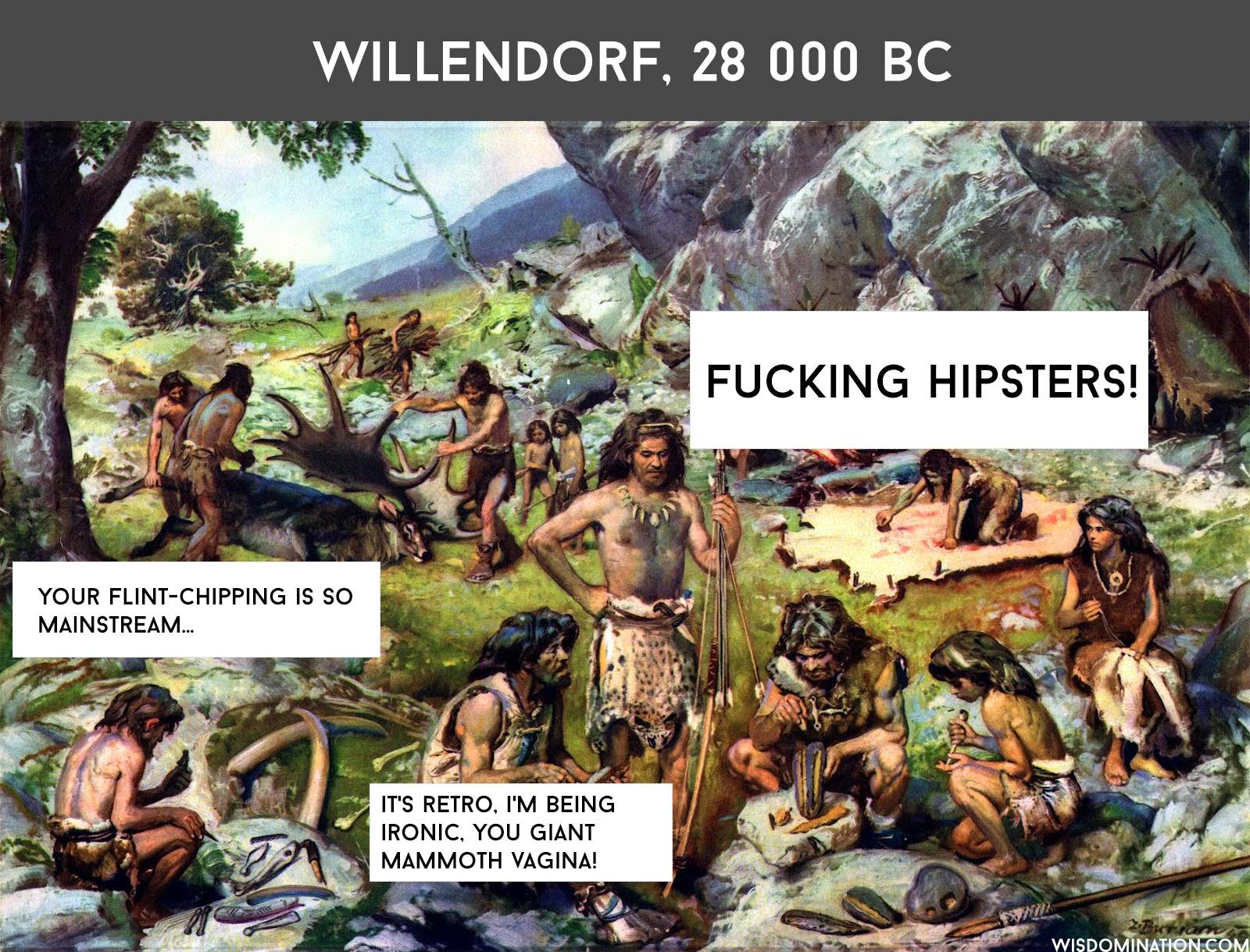If you use Facebook, you’ve seen your fair share of “Society these days” memes, where people complain about alleged societal and moral decline (in reality, usually their own injured narcissism, but we’ll get to that in a moment). All share two features:
1) The failings they allege to be signs of modern crisis, if not outright degeneracy, are invariably universal and timeless features of human nature, attested in comparable complaints since the beginning of written language. There being a general tendency for human nature to not change over non-geological periods, we can safely infer they were likewise present long, long before. So much for the “these days” bit.
2) They are illegitimate not only in content (quod erat demonstrandum), but also in form – precisely because they blame “society”.
But “society” is only an abstraction, and accusing it of anything betrays laziness of thought. In reality, only specific people can be responsible for anything. Whoever complains about society, let him go out, point a finger and say “Good morning neighbor, the moral decline of youth is your fault”, or shut the hell up. So much for the “society” bit.
Thinking of others in terms of abstractions is a huge dick move.
This leads to another important point – thinking of other people in terms of an abstraction such as “society” (or “state”!) dehumanises them, which makes aggression easier to rationalise (or make it feel like defence). For example, the guilt that would normally accompany excessive entitlement and unreasonable demands (in non-sociopaths) can be softened by substituting an abstraction for concrete others, as per “Society should do more to support <group the speaker belongs to>”.
Demanding something from an abstracted total sum of humanity feels better (or less bad) than demanding it from specific people, in the same way that carpet bombing a city feels “better” than shooting a person at point blank range, but it is imperative to remember all such demands are ultimately raised to individual feeling, living others.
It feels like “society” can’t be substantially hurt and has resources to accomodate any individual’s demands, but that’s just because the costs are widely distributed, whereas the gains are tightly concentrated. That doesn’t make it any less exploitative.
To illustrate the required shift in thinking, take the following statement:
“Society should support the arts.”
Few people will disagree.
Now imagine approaching a random stranger on the street and saying this:
“Hello, your share of supporting Heinrich the interpretative dancer is $2.”
Few people will agree.
It is not that people in the second scenario suddenly abandoned a principle they supported five seconds ago. It is that the underlying reality of what’s happening was deliberately obscured in the first scenario by abstract wording.
Such euphemisation has broad political applications and every manipulative asshole in the world uses it. Examples include “Ministry of defence” (warfare), “Collateral damage” (dead civilians), “Right-sizing” (mass sackings),”Liberation” (more often than not, occupation – the exact opposite) and innumerable others.
Used this way, “Society” is exactly such a weasel word.
Which is why I want everybody to pay attention and keep this in mind.
As an exercise in not being a colossal douchebag, whenever somebody insists that “society” should do something, even if it appears reasonable or justified or obvious at first glance, translate the proposition into real personal terms and ask yourself if it still looks like a moral, reasonable and practical thing to do.
Spoiler: it rarely will.
This is the practical political risk of indiscriminately blaming “Society” – the more we can convince ourselves that the “system” or “society” are corrupt, unfair and “rigged”, the easier we can justify our own cheating.
Society-milking works well in parallel with society-blaming, because it makes abuse seem justified and even moral.
Says Dan Ariely:
Our dishonesty becomes retribution, a compensatory act… We tell ourselves that we’re not doing anything wrong, we’re just getting even. We might even take this rationalization a step further and tell ourselves that we are simply restoring karma and balance to the world. Good for us, we’re crusading for justice!
What “we” are really doing, of course, is trying to take other people’s stuff.
“Society” as an abstract concept dehumanizes other people by thinking of them as a monolithic mass that can be blamed and held responsible for everything, cannot be appreciably hurt, and anything can be demanded of it. Serious as this is, it is not the only problem.
Psychologically, complaints about society are coping mechanisms.
“Society” in the abstract sense is a broad universal scapegoat/conspiracy theory that allows some people to abreact unrealistic negative beliefs about the world and others, and raise their own self-image by judging others unfairly.
If Adler is to be believed, the need to feel superior to a generalised “society” (i.e. everybody else) is a compensation for (frequently accurate) feelings of inferiority. This fits observational data.

xkcd
Conclusion
The problem with negative social narratives is that they lead to a skewed, doom-and-gloom worldview that is bad for mental health, bad for effective functioning and bad for dealing with other humans meaningfully – and humanely. It is hard to be a good person with an underlying belief that everyone else is ruining everything.
In terms of transactional analysis, they represent the life position “I am okay – you are not okay” of a compensatory variety – resulting when unrealistic self-images collide with reality, and the blame for disappointment has to go somewhere. So it goes outwards, because that seems like the less painful way. But instead of the healthy self-reflection and improvement that could be derived from a bit of good old fashioned ego bruising, it leads to a seething negativism and sulking avoidance which is incredibly harmful – and much more painful – in the long run.
It is easier to rationalize personal failures in terms of universal features of the world and “other people’s faults”, but it is almost never true.
Alternately, excessive pessimism rationalizes laziness – “why bother when things are so bad”. But they aren’t.
In reality, the world is getting better all the time. Almost everywhere in the world is vastly better off than it was at any other point in history. That’s not to say that everything is fine – only that indiscriminating pessimism is not the way to fix the shortcomings that do exist, and neither is it intended to be. It is intended to be a temper tantrum.
The world is actually better than it ever was.
Now go out and help make it even better.
Enjoying the reading? Buy me coffee.


